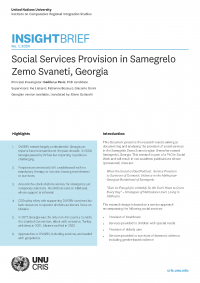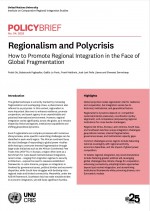Social Services Provision in Samegrelo Zemo Svaneti, Georgia

The Insight Brief investigates the provision of social services in the Samegrelo Zemo Svaneti region of Georgia, with a focus on the impact of geopolitical processes on the availability and accessibility of these services. The research specifically examines services for survivors of domestic violence and access to healthcare for drug users, highlighting the challenges faced by these vulnerable populations in a conflict-affected region. The brief underscores the critical role of civil society organizations in filling service gaps and advocating for policy changes, while also emphasizing the need for greater government commitment and international support to ensure equitable access to essential social services. The study's findings contribute to a deeper understanding of the complex interplay between geopolitics and social service provision in conflict zones, offering valuable insights for policymakers and practitioners working to address the needs of marginalized communities.
Key findings:
- DV/GBV remain largely undeclared in Georgia yet reports have increased over the past decade. In 2006, Georgia passed a DV law but reporting to police is challenging.
- Perpetrators are mostly left unaddressed with no mandatory therapy or eviction, leaving resettlement to survivors.
- Around-the-clock shelters are key for emergency yet temporary solutions. No shelters exist in Abkhazia where support is informal.
- CSOs play a key role in supporting DV/GBV survivors but lack resources to operate shelters as donors focus on Ukraine.
- In 2017, Georgia was the only non-EU country to ratify the Istanbul Convention, albeit with a reserve. Turkey withdrew in 2021; Ukraine ratified in 2022.
- Approaches to DV/GBV, including services, are loaded with geopolitics.
This Insight Brief is available in English and Georgian below.

